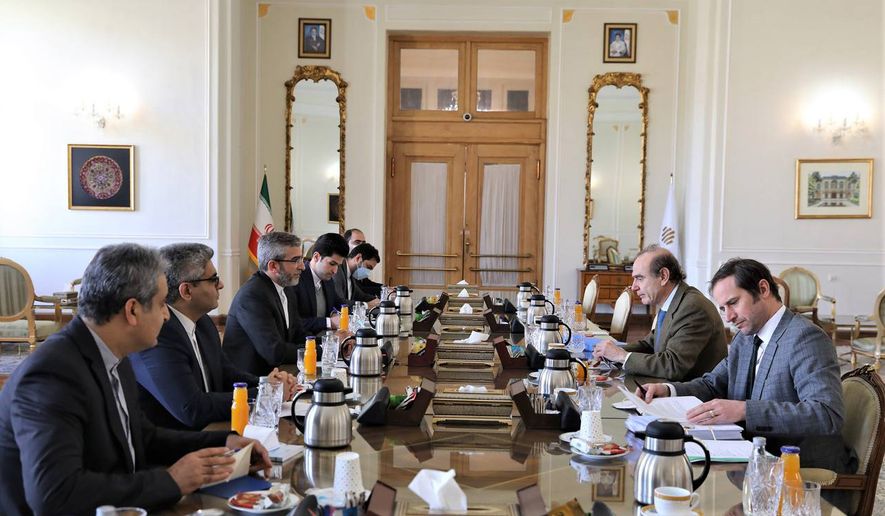OPINION:
Multiple recent reports have suggested that the Biden administration is seriously considering a decision to remove the terrorist designation for Iran’s Islamic Revolutionary Guard Corps (IRGC). The hardline paramilitary organization is a driving force for religious terrorism throughout the region and the world, as well as one of the leading sources of repression for the Iranian people, and its 2017 designation by the United States was considered long overdue. It was also arguably effective in cutting off IRGC affiliates from global markets and thus putting the squeeze on all of its terrorist proxies, including Lebanese Hezbollah and the so-called Popular Mobilization Units in Iraq.
This assessment was reiterated last week by a coalition of pro-democracy opposition groups known as the National Council of Resistance of Iran (NCRI). In response to the widespread speculation about looming US sanctions, the NCRI prepared a report outlining the history and ongoing destructive influence of the IRGC, and the importance of maintaining the current terrorist designation. It noted that “Tehran has reportedly made IRGC’s exclusion from the [Foreign Terrorist Organization] list one of its main demands” in the Vienna negotiations which aim to restore the 2015 Iran nuclear deal, precisely because its inclusion “has handicapped many of the IRGC-related foreign financial transactions.”
In his remarks to the media about this report and its context, Alireza Jafarzadeh, the deputy director of the NCRI’s Washington office, described the prospective delisting as part of a pattern of “concessions by Western countries” which has “emboldened Tehran to step up its terrorism in the region.” Earlier in March, the NCRI highlighted one aspect of this acceleration by revealing that the IRGC’s foreign special operations division, the Quds Force, had established a dedicated naval unit with the goal of providing regional proxies the training, equipment, and logistics to expand maritime operations against Western and Arab commercial and military vessels.
In the immediate aftermath of the revelation, it became abundantly clear that the IRGC remained committed to its traditional malign activities at the same time as it persisted in experimenting with new ventures. Less than three years after it was first revealed that the IRGC maintains its own space program, its officials boasted of having launched a second surveillance satellite into orbit. Although the strategic value of the satellite itself is unclear, the space launch had the further effect of reminding Iran’s foreign adversaries about the ongoing progress of the IRGC’s ballistic missile program, which could one day provide it with a weapon capable of exiting and then reentering the Earth’s atmosphere while carrying a nuclear warhead.
The IRGC’s readiness to use such weapons offensively was also made clear in March when a volley of missiles landed in Erbil, Iraq, very near a US consulate building that was under construction, as a reminder of the additional threats that US assets and interests would face if the IRGC were not subject to the most vigorous enforcement of economic sanctions.
That enforcement is made all the more important by the fact that terrorist designation was withheld from the IRGC for nearly four decades despite having been plainly justified since the earliest days of its foundation in April 1979. The NCRI’s report specifically highlight’s the paramilitary organization’s links to the bombings of the US Marine barracks in Lebanon in 1983, the Arab-Israeli Mutual Association in Argentina in 1994, and Saudi Arabia’s Khobar Towers in 1996, as well as to “suicide drone” attacks on Saudi Aramco petroleum infrastructure in 2019. It also notes that in parallel with these and countless other attacks, the IRGC was continually consolidating its power at home – acquiring controlling interests in entire Iranian industries with the help of high-level political connections, while also establishing itself as the most feared repressive force in Iranian society.
Today, the NCRI and other experts on Iranian affairs believe that IRGC operations and front companies alongside Ali Khamenei, the Supreme Leader’s conglomerates account for the vast majority of the country’s gross domestic product. Of course, this means that even when the 2015 Iran nuclear deal was in full force and sanctions on the Islamic Republic were largely suspended, very little revenue made its way back to the Iranian people while much was channeled back into the regime’s terrorist and other malign activities. That situation was well recognized by the Iranian people, who have been staging nationwide uprisings, making it clear that their economic hardships stemmed not from sanctions but from the self-serving priorities of the IRGC and the Iranian regime as a whole.
Growing activities of the defiant youth in various cities of Iran, with many setting fire to billboards that depicted Khamenei, Ebrahim Raisi, the president, and the late Quds Force commander Qassem Soleimani, who had been killed in a US drone strike in January 2020. Or, torching the statue of Soleimani on the same day it was unveiled, in January this year clearly shows the Iranian people’s outrage against the top leaders and the IRGC as a whole. Such protests persist despite, or perhaps because of the fact that the IRGC was the main perpetrator of a crackdown on the November 2019 uprising which killed at least 1,500 people.
By so bravely standing up against the world’s worst instrument of state terrorism, the Iranian people strongly underline the shameful nature of a looming capitulation to that entity by the Biden administration and its European allies. As Jafarzadeh, the NCRI official, put it, if the IRGC’s terrorist designation were removed as a condition of a nuclear deal, then “instead of holding the regime accountable for its stepped-up terrorism, the West would be rewarding terrorism, leading to even more violence.”
- Mr. Ridge was the nation’s first Homeland Security Secretary and the Governor of Pennsylvania




Please read our comment policy before commenting.